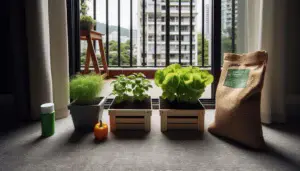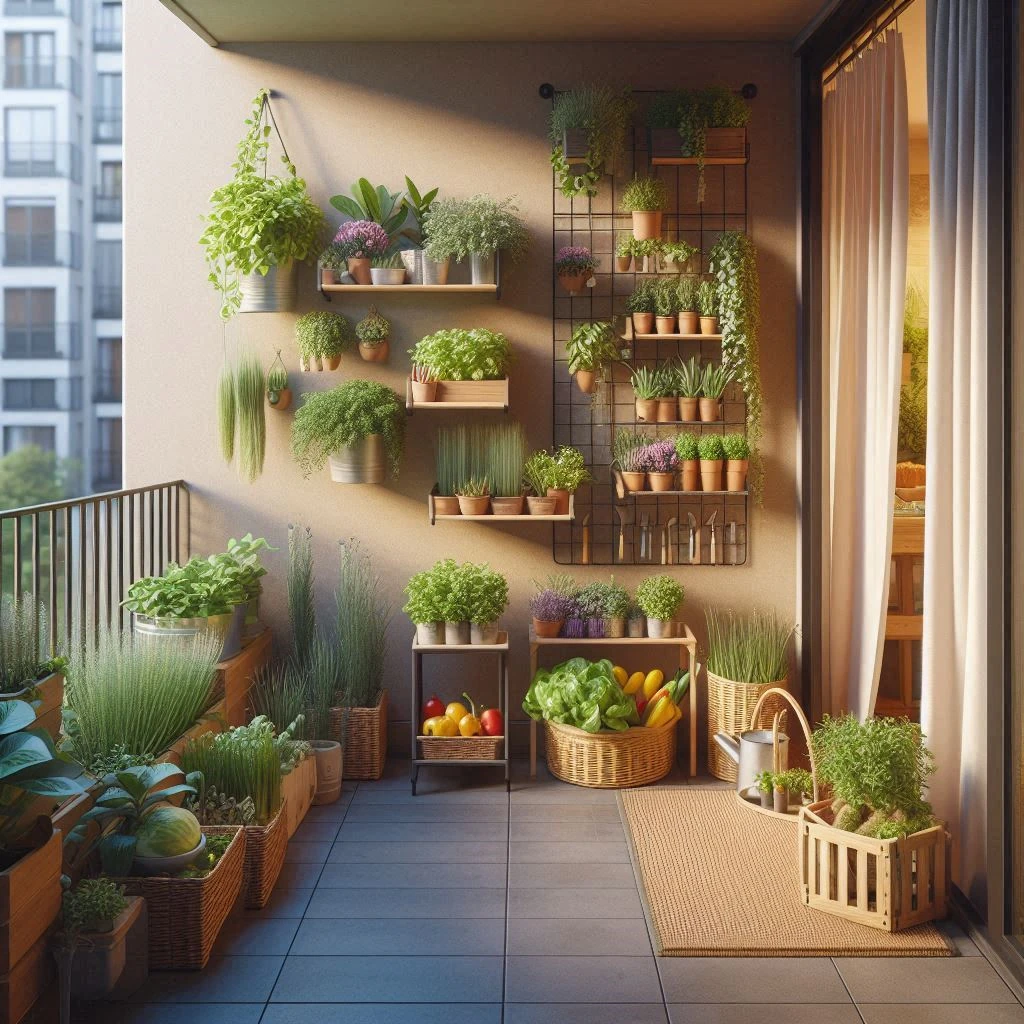There are many good fertilizers on the market—but we’re here to highlight the top fertilizers for urban gardens.
For city gardeners, choosing the right fertilizer can make a big difference in plant health and productivity. Organic options like compost, manure, worm castings, bone meal, and fish emulsion are fantastic choices. Not only do they feed your plants, but they also improve soil texture and boost microbial diversity. That’s a game-changer—especially if you’re working with poor or compacted urban soil.
On the flip side, synthetic fertilizers offer a fast, straightforward way to deliver nutrients. Balanced NPK mixes (Nitrogen, Phosphorus, Potassium) are popular because they target the core needs of most plants. They’re great for a quick boost. However, keep in mind that synthetic fertilizers are a short-term fix and don’t improve soil health over time.

🌿 Slow and Steady Options
Slow-release fertilizers are perfect for the “set it and forget it” crowd. They provide a steady nutrient supply, reducing how often you need to apply them. That’s especially helpful if you’re busy or working with small, hard-to-reach growing spaces.
💧 Liquid Fertilizers for Tight Spaces
Liquid fertilizers are ideal when you need fast results. Just mix with water and apply using a watering can. They’re perfect for container gardens or vertical planters where spreading granular fertilizers might be difficult. Their quick uptake gives plants a noticeable lift, in a hurry!
All in all, understanding your garden’s needs will help you choose the right product. Consider your space, how much time you have for maintenance, and what kind of growth you’re aiming for. With the right approach, the top fertilizers for urban gardens can take your small-space setup from average to abundant.
🧪 Meeting Nutrient Needs in Urban Gardening
Every plant has specific nutrient needs that support its growth and productivity. In urban gardening, understanding these needs is key to making the most of your space and resources. This knowledge also helps when deciding which of the top fertilizers for urban gardens best fits your setup.
🌿 Nitrogen (N)
Nitrogen is essential for leafy growth. It helps plants develop a lush, green appearance by driving chlorophyll production. This is especially important when growing herbs or leafy greens, where foliage is the main goal.
🌸 Phosphorus (P)
Phosphorus supports strong root development and promotes flowering. If you’re growing flowering plants or fruiting crops like tomatoes and peppers, consistent phosphorus will lead to better blooms and bigger harvests.
💪 Potassium (K)
Potassium is an all-rounder. It strengthens plant health, improves stress resistance, and boosts disease defense. That’s crucial in urban gardens where pollution, wind, and erratic weather can take a toll on your plants.
🧱 Secondary Nutrients
Calcium and magnesium often get overlooked, but they’re just as important. These secondary nutrients help with structural development and support vital metabolic functions. Without them, plants can struggle to thrive—even with the right NPK levels.
🔬 Micronutrients
Micronutrients like iron, zinc, and manganese are needed in tiny amounts, but they make a big difference. A deficiency can lead to yellowing leaves, weak growth, or poor productivity. Make sure your fertilizer includes these essential trace elements—or supplement as needed.
Providing a balanced nutrient mix tailored to your plants ensures strong growth, even in compact spaces. While urban gardens face unique challenges, smart nutrient management and the right fertilizers can help your plants flourish just as well as those in larger gardens.
🪴 Applying Fertilizers in Space-Constrained Urban Areas
Urban gardening often means working with limited space—balconies, rooftops, vertical setups, and containers. In these settings, how you apply fertilizer can have a big impact on plant health and yield. The right strategy helps you make the most of every inch. And when you’re gardening in containers or tight spaces, choosing the top fertilizers for urban gardens becomes even more important.
🧂 Controlled-Release for Small Spaces
Controlled-release fertilizers are ideal for small-space gardens. They deliver nutrients gradually, reducing the need for constant reapplication. This is a time-saver if you’re juggling a busy schedule or don’t have easy access to your planting area.
💧 Liquid Fertilizers for Precision
Liquid fertilizers offer precision and convenience. Mix them with water and apply evenly with a watering can—no mess, no guesswork. They’re perfect for vertical gardens and containers where granular options might be hard to spread effectively.
🪴 Container Garden Considerations
Containers demand careful nutrient management. Since there’s limited soil volume, nutrients get used up quickly or washed out with watering. That’s why it’s essential to monitor your plants closely and replenish nutrients regularly with high-quality products designed for urban gardens.
Smart fertilizer application in small urban spaces helps plants thrive while reducing runoff and waste. By choosing the right delivery method and using the top fertilizers for urban gardens, you’ll create a healthier, more productive, and sustainable growing environment—even in the smallest of spaces.
🌾 Top Fertilizers for Urban Gardens: Enhancing Soil Health
Urban environments often come with compacted, depleted, or even contaminated soil. Improving these conditions is essential for growing healthy plants. That’s where the top fertilizers for urban gardens—especially organic options—can make a big difference.

Organic fertilizers like compost, aged manure, and worm castings do more than feed your plants. They also improve soil texture and promote beneficial microbial life, helping roots absorb nutrients more effectively.
🧪 Start With Soil Testing
Before amending your soil, it’s smart to know what you’re working with. A basic soil test reveals which nutrients are present and which are lacking. Inexpensive test kits are available at most garden centers and can guide you in making targeted improvements.
🌱 Add Organic Matter Regularly
Soil improvement is an ongoing process. Regularly adding organic matter—like compost, mulch, or decomposed leaves—keeps the soil rich and healthy. These materials help retain moisture, regulate temperature, and protect essential soil organisms.
Over time, consistent organic practices lead to more resilient plants that can better handle urban stressors like pollution and heat. By choosing soil-friendly options from the top fertilizers for urban gardens, you’ll support not just your plants, but the surrounding environment too—reducing erosion, improving water retention, and building a stronger ecosystem from the ground up.
BEST Organic Fertilizer for Container Gardens
Selecting the Top Fertilizers for Urban Garden Vegetables
Leafy Greens
Urban gardens call for smart fertilizer choices, tailored to the specific needs of your plants. For leafy greens, fertilizers rich in nitrogen are ideal. They encourage the lush, green growth these plants are known for, ensuring you get a full and vibrant crop.
Fruiting Plants
Then, for the fruiting plants like tomatoes and peppers, a more balanced or even phosphorus-rich fertilizer works best. This supports root health and boosts fruit production, helping you make the most of your growing season.
Herbs
Herbs, which tend to be lighter feeders, can benefit greatly from organic mixes or compost. These enhance flavor and vigor without overwhelming the plants. Regular feeding with organic matter maintains soil health and keeps herbs thriving.
The Eco-Friendly Solution
Opting for eco-friendly, slow-release fertilizers is a sound choice for the environment. These options reduce the risk of nutrient runoff that can lead to pollution, aligning your urban gardening efforts with sustainable practices.
By understanding the specific needs of your urban vegetables and selecting the appropriate fertilizers, you create a thriving mini-ecosystem that maximizes productivity while remaining mindful of the environmental impact.
❓ Frequently Asked Questions About Fertilizers for Urban Gardens
Organic fertilizers like compost, worm castings, and fish emulsion are great for small urban gardens. They improve soil health while providing slow, steady nutrients—ideal for containers, raised beds, and rooftop gardens.
Not always. Herbs prefer lighter feeding and do best with compost or mild organic blends. Leafy greens need nitrogen-rich fertilizers, while fruiting vegetables like tomatoes benefit from phosphorus for flowering and fruiting.
Yes. Slow-release fertilizers are perfect if you don’t have time to fertilize often. They provide a consistent supply of nutrients over time and reduce the risk of overfeeding.
Use diluted liquid fertilizer and follow the product instructions closely. Monitor plant health and adjust based on growth patterns. Over-fertilizing can lead to salt buildup and harm plant roots in confined spaces.
Not necessarily, but they’re more of a short-term solution. Synthetic fertilizers give plants a quick boost but don’t improve soil health. For long-term success in urban gardens, organic and eco-friendly options are usually better.
🧑🌾 How To Apply Fertilizers in Urban Gardens
Follow these simple steps to get the most out of your fertilizer in a small-space garden:
- Choose the Right Fertilizer
Pick a fertilizer based on your plants’ needs:
Leafy greens = nitrogen-rich
Fruiting plants = phosphorus-heavy or balanced
Herbs = compost or mild organic blends - Read the Label
Always check the package for dosage and frequency instructions—over-fertilizing can damage your plants, especially in containers.
- Apply Based on Garden Type
Containers: Use liquid fertilizer diluted in water or slow-release pellets.
Raised beds: Mix compost or granular fertilizer into the top few inches of soil.
Vertical gardens: Use a watering can to apply liquid fertilizer evenly. - Water After Applying
Most fertilizers work best when watered in. This helps nutrients absorb into the root zone and prevents burn.
- Monitor Plant Health
Watch for yellowing leaves, slow growth, or leaf spots. These may signal a nutrient imbalance or the need to adjust your feeding schedule.
I hope this article helps in some small way and as aways, Happy Gardening!




